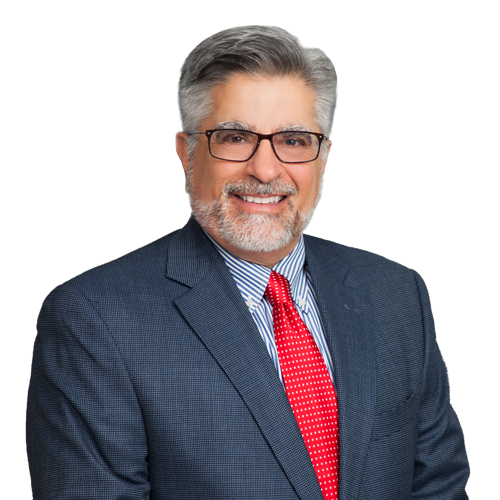Q&A With Carlton Fields' David Burke
 David P. Burke is a shareholder in the Tampa office of Carlton Fields Jorden Burt PA and chairman of the firm’s tax practice. Burke’s practice focuses on federal, state and international taxation planning and business planning; state and federal tax controversies, including tax audits and appeals before the Internal Revenue Service and the Florida Department of Revenue; and tax litigation in the U.S. Tax Court (and other federal courts) and Florida courts.
David P. Burke is a shareholder in the Tampa office of Carlton Fields Jorden Burt PA and chairman of the firm’s tax practice. Burke’s practice focuses on federal, state and international taxation planning and business planning; state and federal tax controversies, including tax audits and appeals before the Internal Revenue Service and the Florida Department of Revenue; and tax litigation in the U.S. Tax Court (and other federal courts) and Florida courts.
Burke is the immediate past chairman of the Florida Bar Tax Certification Committee. He is on the executive committee of the Florida Bar tax section.
Q: What is the most interesting or challenging tax problem you've worked on to date?
A: Reflecting on 32 years of practice, there are many that come to mind; I will share two that stand out.
The first was nearly 30 years ago. I represented an elderly couple from New York who retired to Florida and were audited by the IRS. They thought they were being audited because someone in their hometown “turned them in.” The IRS was seeking approximately $250,000 in taxes, a substantial sum of money then and most of their savings. It took a couple years, but we ultimately settled for no deficiency.
What made it challenging was the fact that the couple had built their house from the ground up. They had no proof of purchase and could not prove basis. They subsequently sold it and the IRS took the position that their basis was zero so the sale price was taxable. It turned out that they had saved pictures of all the work they had done on the house, including clearing the land. They had pictures with a date of 1957 imprinted on them with the husband on a tractor waiving at his wife as he tore out railroad trestle, tree stumps, and boulders. With the clients’ help, we put together a complete book with part black and white photos and part color photos that showed every step of the construction of the house down to pictures of the roof trusses and nails holding the roof down. We had pictures of nearly all of the completed construction.
Because we had cut off the audit by refusing to further extend the statue of limitations, the IRS treated every bank deposit as income and allowed no deductions. We painstakingly responded to every item. It was very rewarding to settle that case for no deficiency, have clients who got the justice they deserved, and have one of the deans of tax law and one of the great tax trial lawyers, Michel Emmanuel, praise you for doing an excellent job.
The second case, which is more recent, consisted of two different taxpayers with the same issue. It too was challenging, but the outcome was likewise favorable to taxpayers. The taxpayers provided zero gravity flights and hot air balloon flights in Florida. The Florida Department of Revenue had a rule that taxed these as an amusement under the theory that the taxpayer was not providing transportation because its customers were leaving and returning to the same location. The Florida DOR charged admissions tax on each customer. After some detailed research and analysis we discovered the federal statute, the Anti-Head Tax Statute, that provided no state could tax any person who was engaged in air commerce, which is broadly defined to include any travel through air space that could be regulated by the Federal Aviation Administration. Based on our analysis and interpretation of the law, the Florida DOR not only dropped its proposed assessment against our clients, but also changed its rule to exempt from sales tax all those types of flights.
Q: Currently, what is a pressing tax concern for your clients, and how are you addressing it?
A: There seems to be a lack of morale at the IRS resulting in a high turnover of trained personnel. As a result, the IRS has had to hire new, inexperienced auditors. The new auditors raise more marginal issues than I have seen before. It is my perception that they spend more time on audits than they should. As a result, they seem to raise issues to justify the amount of time spent. Don’t get me wrong: There are plenty of issues in any audit, but the newer auditors seem to feel the need to come up with more issues to justify the time spent. You end up dealing with issues that are not well thought out.
Compared to IRS representatives in the past, the new auditors lack the experience and historical background on IRS operations to properly address taxpayer audits the way experienced auditors would. In an effort to avoid this, I work with my CPA counterparts on the cases to push the auditors on the time they spend on the audit and to settle and resolve every issue they can at the first level. The relationship the CPAs Pas have with the auditors is not as confrontational as it is with the tax lawyer. That has seemed to help.
Q: What do you anticipate being the biggest regulatory challenge in your practice in the coming year and why?
A: Congress’ abdication of tax law writing by giving the U.S. Department of the Treasury so much legislative regulation drafting power. As a result, Treasury Department puts out a constant, overwhelming volume of new regulations that not only interpret the tax laws, but make them too. Each regulatory project generates hundreds of pages of new regulations on narrow issues of tax law. Because they are legislative regulations in many cases, they are the actual law. Taxpayers are stuck waiting to find out what the law is or will actually be, sometimes for many years. It is overwhelming when regulations are issued because of the volume and complexity, and it is a risky time for taxpayers waiting for the regulations. Taxpayers are unsure what the law is while they wait, and they still have to file tax returns while not knowing what the law is. Of course, tax professionals have brought some of this on themselves because often these innumerable pages of information, analysis, and defense by Treasury are an attempt to plug loopholes and aggressive tax shelters used to try avoid paying any tax at all. The sheer volume of regulations has overwhelmed clients and tax professionals in dealing with the constant flow of that information.
The constant tax reform discussions — and the open-ended nature of the tax rates — and what will or will not be taxed is another regulatory challenge for professionals and taxpayers. The uncertainty created by constant discussions about tax reform and tax changes creates additional uncertainty for businesses and tax professionals. It makes it difficult for either to help the other in planning the future.
Q: Outside of your own firm, who is an attorney in your practice area whom you admire, and what is the story of how s/he impressed you?
A: Joel Maser with Greenberg Traurig, whom I have known for decades. Joel is an intelligent and capable tax lawyer and I’ve had the pleasure to work with on a number of transactions over the years. Joel is the reason for my heavy involvement in The Florida Bar’s tax section. Nearly 20 years ago he introduced me to the tax section and took the time to shepherd me through the section and make me feel at home. I have worked with Joel on many of the bar’s tax section divisions. He is a great mentor to the bar in this capacity.
In working on tax matters with Joel, I have been impressed with his grasp of the tax law and his ability to distill issues and solutions quickly and accurately. His tax knowledge is second to none.

